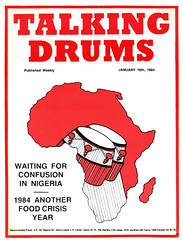The Real Tragedy Of The Nigerian Coup
E.K.M. Yakpo
In our anxiety to condemn military regimes we seem to have fallen into the trap set for us by the West, that Western-style parliamentary elections are the only way in which a country can establish that its government legitimately represents the will of the people. And therefore such elections, no matter the circumstances under which they are conducted, or the results they produce, are taken as proof of legitimacy.
To promote this view US administrations, in particular, pressure all sorts of regimes to stage "democratic elections' (as was recently the case in El Salvador, Guatemala and Lebanon), so as to satisfy simplistic American domestic opinion, that political, financial and military support is justified. In this vein, the re-election of Shagari, four months ago, was hailed as a triumph for democracy, and its overthrow a tragedy for democracy. Nothing can be further from the truth.
The last Nigerian elections were riddled with fraud and commanded little respect in the eyes of the Nigerian people. In his article "British media and the Nigerian Coup d'Etat" (Talking Drums, 9th January 1984), Mr John Hughes reasoned that Mrs Thatcher stage-managed her re-election by employing professional advertisers to project her image, instead of presenting the public with her policies. If the pundits are to be believed, he argues, then no one will defeat Mrs Thatcher, as long as Saatchi and Saatchi remain in business ...and that sounds to me like electoral fraud if ever there was one." he concludes. It is not clear whether this is meant to justify fraud in Nigerian elections, but the main weakness of the argument is that the British public does not view the last election as having been fraudulently conducted and retains confidence in the system. Elections are a ritual and serve only two purposes (1) to give the system a new lease of life, and (2) to re-enforce the people's faith in the system. The last Nigerian elections did neither.
This is not to suggest that the new military regime is welcome. All military regimes are detestable. But we must remember that as long as we wait for military regimes to hand over power to civilian regimes, there will never be stability. It is naive to believe that anyone could genuinely hand over political power and disappear from the scene. There is only one way of acquiring political power - by force. Africa would have been a different place today if we had won our independence in the battlefield instead of having it presented to us after an appropriate "constitutional conference". This tradition seems to linger on and after each coup, we expect the military to hand over power and go back to the barracks and stay there. Anyone who can give you power can also take it away!
Our hatred for military regimes must not blind us to the real problem, that African armies have no tradition of defending any particular political system. They are still largely "British trained" therefore meant for our suppression. The only solution is to take them by their own game, this is conduct a people's war against them and beat them at it.
